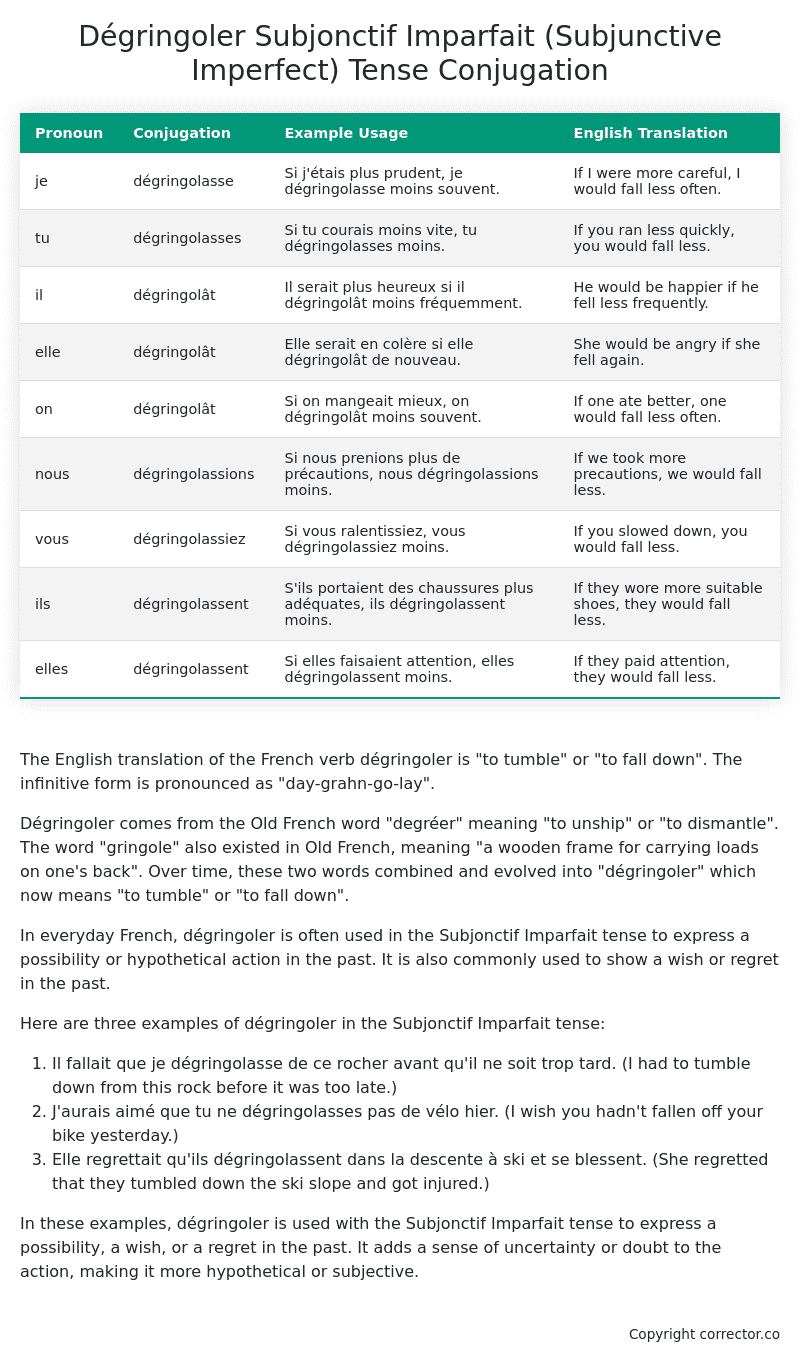Subjonctif Imparfait (Subjunctive Imperfect) Tense Conjugation of the French Verb dégringoler
Introduction to the verb dégringoler
The English translation of the French verb dégringoler is “to tumble” or “to fall down”. The infinitive form is pronounced as “day-grahn-go-lay”.
Dégringoler comes from the Old French word “degréer” meaning “to unship” or “to dismantle”. The word “gringole” also existed in Old French, meaning “a wooden frame for carrying loads on one’s back”. Over time, these two words combined and evolved into “dégringoler” which now means “to tumble” or “to fall down”.
In everyday French, dégringoler is often used in the Subjonctif Imparfait tense to express a possibility or hypothetical action in the past. It is also commonly used to show a wish or regret in the past.
Here are three examples of dégringoler in the Subjonctif Imparfait tense:
- Il fallait que je dégringolasse de ce rocher avant qu’il ne soit trop tard. (I had to tumble down from this rock before it was too late.)
- J’aurais aimé que tu ne dégringolasses pas de vélo hier. (I wish you hadn’t fallen off your bike yesterday.)
- Elle regrettait qu’ils dégringolassent dans la descente à ski et se blessent. (She regretted that they tumbled down the ski slope and got injured.)
In these examples, dégringoler is used with the Subjonctif Imparfait tense to express a possibility, a wish, or a regret in the past. It adds a sense of uncertainty or doubt to the action, making it more hypothetical or subjective.
Table of the Subjonctif Imparfait (Subjunctive Imperfect) Tense Conjugation of dégringoler
| Pronoun | Conjugation | Example Usage | English Translation |
|---|---|---|---|
| je | dégringolasse | Si j’étais plus prudent, je dégringolasse moins souvent. | If I were more careful, I would fall less often. |
| tu | dégringolasses | Si tu courais moins vite, tu dégringolasses moins. | If you ran less quickly, you would fall less. |
| il | dégringolât | Il serait plus heureux si il dégringolât moins fréquemment. | He would be happier if he fell less frequently. |
| elle | dégringolât | Elle serait en colère si elle dégringolât de nouveau. | She would be angry if she fell again. |
| on | dégringolât | Si on mangeait mieux, on dégringolât moins souvent. | If one ate better, one would fall less often. |
| nous | dégringolassions | Si nous prenions plus de précautions, nous dégringolassions moins. | If we took more precautions, we would fall less. |
| vous | dégringolassiez | Si vous ralentissiez, vous dégringolassiez moins. | If you slowed down, you would fall less. |
| ils | dégringolassent | S’ils portaient des chaussures plus adéquates, ils dégringolassent moins. | If they wore more suitable shoes, they would fall less. |
| elles | dégringolassent | Si elles faisaient attention, elles dégringolassent moins. | If they paid attention, they would fall less. |
Other Conjugations for Dégringoler.
Le Present (Present Tense) Conjugation of the French Verb dégringoler
Imparfait (Imperfect) Tense Conjugation of the French Verb dégringoler
Passé Simple (Simple Past) Tense Conjugation of the French Verb dégringoler
Passé Composé (Present Perfect) Tense Conjugation of the French Verb dégringoler
Futur Simple (Simple Future) Tense Conjugation of the French Verb dégringoler
Futur Proche (Near Future) Tense Conjugation of the French Verb dégringoler
Plus-que-parfait (Pluperfect) Tense Conjugation of the French Verb dégringoler
Passé Antérieur (Past Anterior) Tense Conjugation of the French Verb dégringoler
Futur Antérieur (Future Anterior) Tense Conjugation of the French Verb dégringoler
Subjonctif Présent (Subjunctive Present) Tense Conjugation of the French Verb dégringoler
Subjonctif Passé (Subjunctive Past) Tense Conjugation of the French Verb dégringoler
Subjonctif Imparfait (Subjunctive Imperfect) Tense Conjugation of the French Verb dégringoler (this article)
Conditionnel Présent (Conditional Present) Tense Conjugation of the French Verb dégringoler
Conditionnel Passé (Conditional Past) Tense Conjugation of the French Verb dégringoler
L’impératif Présent (Imperative Present) Tense Conjugation of the French Verb dégringoler
L’infinitif Présent (Infinitive Present) Tense Conjugation of the French Verb dégringoler
Struggling with French verbs or the language in general? Why not use our free French Grammar Checker – no registration required!
Get a FREE Download Study Sheet of this Conjugation 🔥
Simply right click the image below, click “save image” and get your free reference for the dégringoler Subjonctif Imparfait tense conjugation!

Dégringoler – About the French Subjonctif Imparfait (Subjunctive Imperfect) Tense
Formation
Common Everyday Usage Patterns
Interactions with Other Tenses
Subjonctif Présent
Indicatif Passé Composé
Conditional
Conditional Perfect
Summary
I hope you enjoyed this article on the verb dégringoler. Still in a learning mood? Check out another TOTALLY random French verb conjugation!


